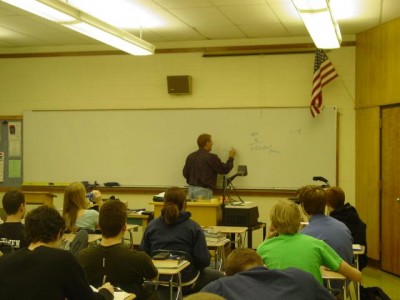
In California, motorists who violate traffic laws are given the option of attending traffic school to reduce the amount of the fine. Since state law treats cars and bicycles the same, cyclists have been subjected to the same high fines levied against motorists.
In response, Huntington Beach recently became the first city in the state to offer traffic school for lawbreaking cyclists. Unlike traffic school for drivers, the Police Department’s Adult Bicycle Safety Program only lasts two hours. The offending cyclist must pay $50 to attend, with all other fines and fees waived. This is a real bargain when you consider that the fine for running a stop sign can be as high as $233.
On the positive side, the traffic school option levels the playing field and allows cyclists to pay a more reasonable fine for the infraction. However, other than the financial aspect of offering traffic school for cyclists, it isn’t clear how the cyclists – or more importantly, the public – will benefit.
Little information is provided in reports about the traffic school, but it appears to focus on teaching “bicycling safety.” On the Huntington Beach Police Department’s Facebook page they describe the Adult Bicycle Safety Program as follows:
“The Huntington Beach Police Department is now offering a new Adult Bicycle Safety Program as part of our continued effort to be a bicycle friendly community. The program is administered like the Juvenile Bicycle Safety Program which has been at our department since 1972. Under this program, individuals issued citations as bicyclists or pedestrians for minor traffic violations can attend the Bicycle Safety Program and have the citation dismissed.”
Reviewing safety information is useful, but if the goal is to have fewer accidents, there should be more emphasis on riding technique. Traffic rules are only half the battle when it comes to riding a bicycle in traffic. And if the adult program is based on the Juvenile Bicycle Safety Program, it probably doesn’t emphasize riding in traffic.
A clue about how the traffic school option may have come into existence can be found on the Newport Beach [California] Police Department’s Facebook page. They posted a notice about what they call an “Enforcement Campaign Targeting Bicycle Safety.”
“The Newport Beach Police Department is announcing a partnership project with the Huntington Beach Police Department, Laguna Beach Police Department, and the Costa Mesa Police Department. These Police Departments will be conducting a specialized Bicycle Safety Enforcement Operation on February 19th and 24th, 2011. Extra officers will be on duty patrolling areas frequented by bicyclists and vehicles. Officers will be addressing traffic violations made by all vehicle operators, bicyclists, and other vehicle drivers that lead to bicycle vs. vehicle collisions, injuries and fatalities.
The goal of the program is to educate the public about the safe and lawful use of bicycles, as well as the safe and lawful use of vehicles that share the roadways with bicycles. Prevention is a key component of the program, which centers on the traffic laws that can prevent bicycle riders from becoming injured or killed due to illegal use or reckless behavior by bicyclists and vehicles. In addition, the Police Departments involved may be required to enforce obvious violations of the City’s Municipal Code to maintain safe operations.
With more traffic congestion on our city streets and more people turning to bicycles as a transportation alternative, we need to make sure that all road users understand the rules, laws and safe behavior; particularly how bicyclists and motorists share the road.”
Although it doesn’t explicitly say so, I would hope that Huntington Beach’s Adult Bicycle Safety Program emphasizes the same things as the Enforcement Campaign Targeting Bicycle Safety. Even if it does, unlike the Enforcement Campaign which targets all road users, the Adult Bicycle Safety Program only teaches these principles to cyclists.
The Motorist Traffic School probably doesn’t focus on sharing the road with bicycles. Rather than stating that “there is a need to help bicyclists improve,” I’d like to see the Huntington Police announce their intention to emphasize sharing the road with bicycles in Motorist Traffic School. Unless motorists learn the same principles, cyclists will be no safer than they were before attending traffic school.
Surprisingly, according to Huntington Beach’s traffic accident data:
“In traffic collisions involving bicyclists and cars between 2008 and 2010, two-thirds of the time the bicyclists were at fault, according to city data. That points to the need to help bicyclists improve, but the law doesn’t provide for that, [Lt. Russell] Reinhart said; it simply punishes riders by levying fines.”
Cyclists are at fault in two-thirds of the accidents? In most other cities, the statistics show the opposite, namely that motorists are responsible for the majority of car vs. bicycle accidents.
Two possibilities exist to explain this disparity. Either the cyclists in Huntington Beach are unusually reckless or, when reporting accidents, police in that area are biased against cyclists and blame them for accidents which may not have been their fault. I have witnessed police bias against cyclists, so I would not rule out the latter option too hastily.
Traffic school for cyclists is unlikely to become a national trend since most states don’t offer traffic school for motorists. Still, the idea of offering Adult Bicycle Safety Programs nationwide is something worth considering.
Knowing how to ride a bicycle doesn’t equate to knowing how to ride in traffic. And, when mistakes are made by either cyclist or motorist, the cyclist always has the most to lose. Prevention by way of educating all road users – not enforcement with stiff fines – is the key to reducing the number of cycling injuries and fatalities.



